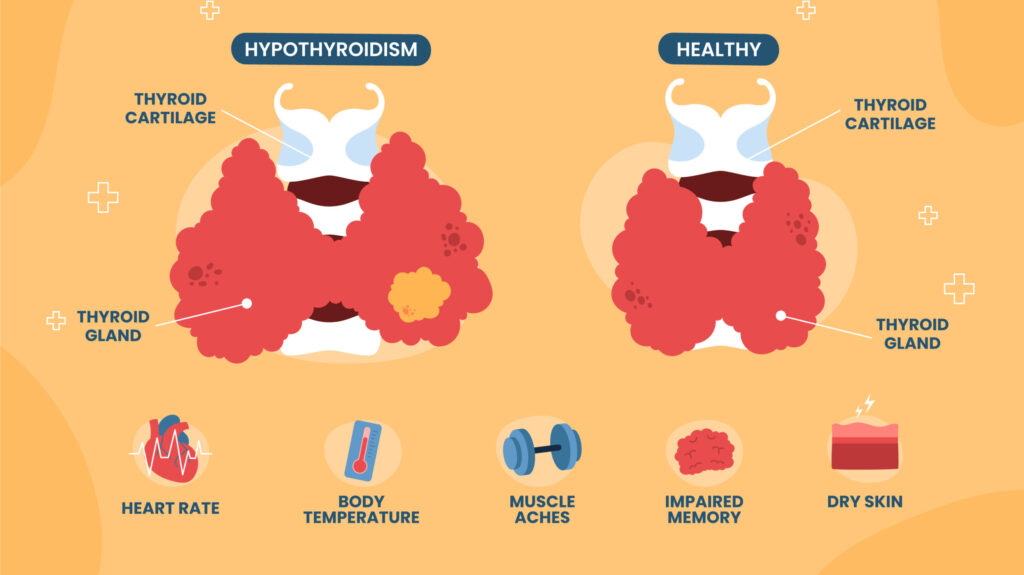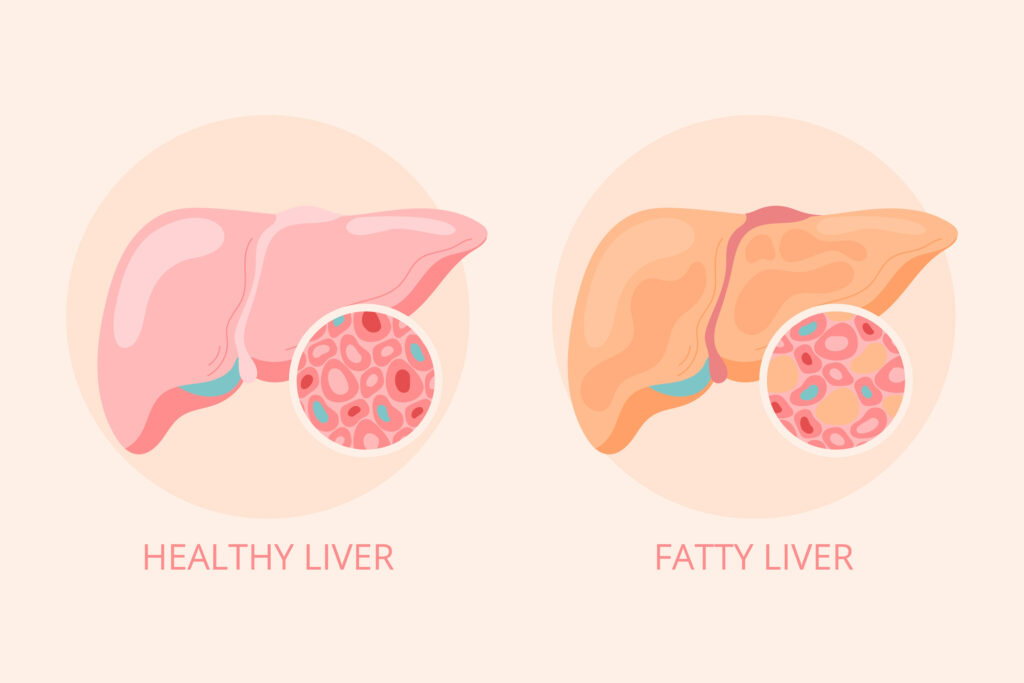Has Your Thyroid Problem Been Misdiagnosed When It Is Hashimoto’s? Read This
Not much has changed in my approach to managing thyroid problems since I helped my first patient 13 years ago. My focus has always been on understanding the root cause of the disorder. Before we start a healing program, we recommend a couple of diagnostic tests.
Why? Because our approach to hyperactive or underactive thyroid versus an autoimmune condition like Hashimoto’s is different. By identifying the specific type of issue through tests, we can tailor a personalized treatment plan that not only helps your medication work more effectively but also promotes overall healing through lifestyle changes.
Do you know what kind of thyroid problem you have? If not, we’re here to help you understand why it’s crucial to know for active condition management.
Understanding Thyroid Disorder
Thyroid disorders can be broadly categorized into hyperthyroidism, hypothyroidism, and autoimmune disorders like Hashimoto’s.
Hyperthyroidism occurs when the thyroid gland produces too much thyroxine (T4), leading to symptoms such as rapid weight loss, anxiety, and tremors. Hypothyroidism, on the other hand, is characterized by an underactive gland that produces insufficient thyroxine, resulting in fatigue, weight gain, and depression.

Autoimmune disorders like Hashimoto’s are unique because they involve the immune system mistakenly attacking the thyroid gland. This is due to molecular mimicry, where the immune system confuses thyroid cells for foreign invaders.
Similarly, in Hashimoto’s, the immune system attacks the thyroid, leading to inflammation and impaired function.
Understanding these distinctions is crucial because the treatment approach varies significantly.
For example, addressing an autoimmune disorder like Hashimoto’s requires a focus on retraining the immune system and managing inflammation, in addition to supporting thyroid function.
Is Thyroid Reversible?
A lot of people think once they start medication, they’re on it for life. But that’s not always true. If you take steps to manage your lifestyle—like reducing stress, eating a balanced diet rich in essential nutrients, and staying active—you might find that your thyroid function starts to improve. This can lead to a reduction in the dosage of your medication or, in some cases, even coming off it entirely by reversing your condition. But remember, any change in medication should always be done under the guidance of your doctor. The goal is to support your thyroid naturally as much as possible, so medication becomes less necessary.

The Importance of Diagnostic Tests
Ever wondered why we emphasize specific diagnostic tests before diving into a thyroid treatment plan? Understanding whether your thyroid issue is autoimmune-related can set you on a different path to healing.
That’s where the Anti-TPO (thyroid peroxidase) and Anti-TG (thyroglobulin) antibody tests come in.
These tests search for thyroid antibodies that signal autoimmune issues like Hashimoto’s disease. Elevated levels of these antibodies can tell us that your immune system is mistakenly attacking your thyroid.
But here’s the catch: these antibodies don’t just point towards thyroid problems. They can also disclose gut issues like a leaky gut.
Your gut has a protective barrier. When compromised, unwanted substances can leak into your bloodstream, causing your immune system to go haywire. By identifying and addressing these antibodies, we can create a treatment plan that not only targets your thyroid but also heals your gut.

Did you know that your gut health could be linked to autoimmune conditions? Let’s break it down with the “fishnet theory.”
Think of your gut lining as a fine mesh. Under normal conditions, this mesh controls what gets absorbed into your bloodstream, keeping harmful substances out. But when we consistently make poor dietary choices or face chronic stress, this mesh starts to weaken, creating larger gaps. This is what’s often referred to as a “leaky gut.”
When these gaps form, larger food particles and toxins can slip through and enter your bloodstream. Your immune system sees these as foreign invaders and starts to attack them. Unfortunately, in the process, it can also start attacking your own tissues, which can lead to autoimmune conditions.
It’s crucial to understand that if a leaky gut isn’t addressed, it can become a gateway to autoimmune diseases. Taking care of your gut is not just about digestion; it’s about protecting your entire body.
And trust me, a happy gut can make a world of difference in managing your condition.
So, why is this connection between your gut, liver, and thyroid important? How can a healthy gut impact your thyroid health and overall well-being?
Understanding this link can open new pathways to managing and potentially healing your condition.
The Role of Liver Health
A healthy gut is crucial for managing autoimmune disorders like Hashimoto’s. This not only exacerbates autoimmune reactions but also burdens the liver, impacting its ability to convert thyroxine effectively.

Your liver and thyroid are more connected than you might think. The liver plays a critical role in converting T4 (thyroxine) into T3 (thyronine), the active form that your body uses. If your liver is sluggish or burdened with fatty deposits, this conversion process can be compromised, leading to low energy levels and other symptoms.
When the liver is overburdened with toxins from processed foods, artificial fragrances, and excessive fat, it can develop fatty liver disease, further impairing its function. This leads to symptoms such as sluggishness, low energy, and weight gain, which are common in thyroid disorders.
Today, we’re exposed to a lot of chemicals called xenoestrogens, which mimic the hormone estrogen in our bodies. These chemicals are found in everyday items like plastics, certain personal care products, and even some foods. When xenoestrogens accumulate in the body, they can disrupt your hormonal balance.
Choosing safer products and being mindful of your environment can go a long way in protecting your thyroid and overall hormonal health. Supporting your liver with the right foods, especially those rich in medium-chain triglycerides (MCTs) like cold-pressed coconut oil, can help improve this conversion and, as a result, your overall thyroid function.
Receiving professional guidance to help you find a way to restore your liver and thyroid health needs professional care. Personalized programs for liver health can aid your overall health, paving the way for a balanced and energized life. To repair the gut barrier, consider these lifestyle tips:
- Give up poor habits: Making small changes in your lifestyle, such as limiting drinking, smoking, and substances can result in a substantial difference. Try to assess habits that harm your liver and gut health and switch them with healthier choices.
- Eat gut-friendly foods: Include fermented foods like yogurt, kefir, and sauerkraut to promote healthy gut bacteria.
- Avoid food intolerances: Identify and eliminate foods that cause bloating, allergies, or other digestive issues.
- Support liver function: Eat foods rich in antioxidants and healthy fats, such as berries, leafy greens, and cold-pressed coconut oil, which help the liver in hormone conversion.
- Stay hydrated: Drink plenty of water to aid digestion and detoxification processes.
- Mindful eating: Chew your food thoroughly and eat home-cooked meals to reduce the intake of processed and junk foods.
- Reduce toxins: Use natural fragrances like essential oils instead of artificial air fresheners to minimize the toxic load on your liver.
One of the best ways to integrate all of these choices into your life is by following the Five Pillars of Lifestyle as explained below.
Deep Cellular Nutrition
When it comes to thyroid health, what you eat can make a huge difference. Your nutrition plan and even the type of salt you use can all play a role. Think of your meals as the fuel for the gland’s function. Key nutrients like vitamin A, B complex, zinc, copper, iodine, selenium, and healthy fats are essential for keeping your thyroid running smoothly.

If you want to heal thyroid problems, start by simplifying your meals. Ditch the processed foods and embrace home-cooked meals packed with these nutrients. A simple change like using a mix of pink and iodized salt can ensure you’re getting enough iodine, crucial for thyroid hormone production.
In one of the first thyroid cases I worked on 13 years ago, we saw significant improvement by simply focusing on better sleep, adding selenium and MCTs to the diet, and ensuring meals were home-cooked and nutrient-rich. We also asked our patient to be mindful of the type of salt they used. While pink salt is popular, it’s important to have a mix of white iodized salt as well because iodine is crucial for thyroid function.
Medium-chain triglycerides (MCTs) like those found in cold-pressed coconut oil are great for the liver, which plays a big role in converting the thyroid hormone T4 into the active form, T3. This is why a holistic approach is so important—everything in the body is connected.
Adequate Exercise
Exercise is vital for managing thyroid conditions, but it doesn’t mean you have to hit the gym hard. In fact, extreme workouts can stress your body and worsen thyroid symptoms.
Instead, be gentle and consistent.

Activities like yoga, walking, and light strength training are perfect. They help maintain a healthy weight, boost your mood, and support your metabolism without overburdening your system. Imagine feeling more balanced and strong by just incorporating these simple exercises into your routine.
Quality Sleep
“Are you respecting your body’s inner biological clock? No amount of technology, organic food, or exercise matters if your biological clock is out of rhythm. The time you eat, sleep, and exercise matters. Align it with your inner clock and nature.”
- Luke Coutinho
If you’re not getting enough sleep or are constantly stressed, it’s going to affect your thyroid function. Sleep deprivation can throw your hormones out of whack and increase stress levels, making your thyroid gland work harder.
To improve your sleep, stick to a regular schedule, create a cozy and quiet sleep environment, and avoid caffeine before bed.
Emotional Health
Most people with thyroid problems have gone through significant stress before their diagnosis. So, when someone comes to me with a thyroid issue, one of the first questions I ask is, “What was happening in your life six months to a year before you were diagnosed?” Almost always, there’s been a major stressor or series of stressful events.
The thyroid gland’s main job is to convert carbohydrates, proteins, and fats into energy. If your thyroid isn’t functioning properly, you might feel tired and sluggish, leading you to think you need to eat more. But really, it’s about improving your thyroid function so your body can effectively convert food into energy.
This is why it’s not just about taking medication. Yes, medication is important, but so are lifestyle changes. Many people with thyroid issues also carry suppressed emotions like anger or bitterness, which can further impact their health. These emotions affect your internal environment and hormones, contributing to imbalances.
So, when it comes to thyroid health, start by understanding exactly what you’re dealing with—whether it’s Hashimoto’s or another thyroid condition. From there, make the necessary lifestyle changes to support your thyroid and overall health.
Try incorporating stress-busting techniques like meditation, deep breathing, or simply taking a stroll in nature. Take a few minutes each day to breathe deeply or enjoy a relaxing walk in the park. Small changes can make a big difference in your thyroid health.
Spiritual Connection
Don’t underestimate the power of spiritual well-being in your overall health journey—it’s a game changer! Finding a spiritual path that resonates with you can bring peace and balance into your life.
For instance, bless your meals before eating.
“You can change the energy of your food by taking a minute to bless it and offer gratitude.”
- Luke Coutinho

Whether it’s through prayer, meditation, or connecting with your inner self, nurturing your spiritual health is a powerful way to enhance your overall well-being.
Final Word
Understanding the root cause of your thyroid problem is the first step toward effective management. Get the tests done, as it is the stepping stone to understanding your body better. With this knowledge, we can help you craft a treatment plan to rejuvenate your well-being. Take that first step towards healing today.
Are you struggling with autoimmune-related thyroid conditions and in need of personalized guidance?
Managing your thyroid health could be the first step.
We help you find a way.
Know more about our Thyroid Care Program here.
Talk to our Condition Management Counsellors.
Set up a one-on-one consultation with our integrative team by reaching out to us at
1800 102 0253 or write to us at consults@lukecoutinho.com.
Disclaimer: Always make an informed choice. Keep your healthcare provider in the loop before trying anything new, especially if you are going through a medical condition or are on medications.
|
From a pimple to cancer, our You Care Wellness Program helps you find a way Talk to our integrative team of experts today 18001020253 |










Leave a Reply